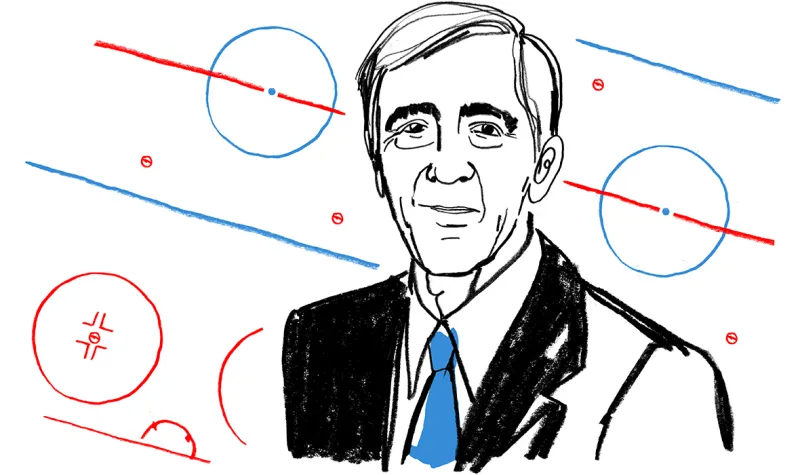
Illustration by Lauren Tamaki
Cohen & Steers generated outsize returns in unplumbed corners of finance, beginning with REITs, in the mid-’80s. Yet today CEO Bob Steers is battling it out every day in a world where passive investments and low fees are the default.
With AC/DC’s sports fan classic "You Shook Me All Night Long" reverberating off the ice at New York’s Madison Square Garden at a recent Rangers game, Bob Steers tells a reporter, “The last thing you want to do is stare at the puck.”
Like many journalists, I’m clearly staring at the puck.
Steers, 65, who co-founded Cohen & Steers with now-retired Marty Cohen in 1986, knows exactly where to look. Hockey is the family sport. Everyone has played, from Steers and his two brothers to his four children and even his 91-year-old mother (“Or at least that’s what she says,” he laughs). Steers, who grew up and then raised his own family in Rye, New York, played hockey in high school and, until two years ago, on the Rye Rangers men’s team. As the coach of his kids’ teams, he’s quick to point out that his daughter was the most natural skater in the family.
We’re sitting in the family seats with Steers’ sons, Andrew and JP, as the New York Rangers — with four novice defensemen and a rookie goalie — face the Pittsburgh Penguins. During his own early career, Steers worked for Oaktree’s Howard Marks at Citibank as an equity research analyst in the late 1970s and then, in 1984, joined a mutual fund firm where he started the first fund to focus on public real estate companies. Steers recruited Cohen, who he met at Citi and who was then managing a real estate stock fund and some real estate investment trusts for a bank, to oversee the fund.
The two went out on their own two years later to focus exclusively on REITs, which gave mainstream investors access to commercial real estate. America’s richest families still controlled the sector at the time. Steers and Cohen were betting their early start would ultimately make them the go-to manager when REITs — which had a $6 billion market cap — went mainstream. As first movers, though, they also endured seven years of doing frustratingly basic things like explaining to investors what exactly a REIT was before gaining any traction.
Their head start paid off. In the 1990s the firm became the king of REITs, even as its competitors became purveyors of just about everything else. By the early 2000s, Cohen & Steers started modestly expanding into other related assets such as preferred stocks, listed infrastructure, and commodities and natural resources. In 2004 the firm went public.
It’s the second period and the Penguins score two goals, despite efforts by Andrew and JP, superstitious sports fans, to mentally help the Rangers — including ordering their usual meals for dinner before the game and surreptitiously arranging the seating for their father and this reporter. But the Penguins, two-time defending Stanley Cup champions, are in possession of the puck and are dominating the game. “The Rangers are trying to be scrappy and make a game of it, and sometimes the underdog wins. I don’t think that will happen tonight,” says Steers.
MORE THAN 30 YEARS after its founding, Cohen & Steers is part of the establishment, but still has plenty of competitors in every product — including REITs, now a $1.7 trillion sector the firm had a hand in shaping. Steers says the firm is hardly immune to the industry’s woes even though it has remained focused on inefficient markets where active managers have a chance to do well and has consistently beaten benchmarks.
The firm is questioning its orthodoxy. With a slice of the asset management industry still unwilling to make changes, I ask Steers what’s different at the firm. He says other asset managers are looking at where the puck is now, not where it’s going to be. (At a Rangers game it’s hard to avoid referencing Wayne Gretzky’s puck quote.)
For one thing, Steers says, his firm has been preparing for the onslaught of passive for at least ten years. In 2015, a year when the firm had record revenues, Steers wrote these dismal words a few lines into his shareholder letter: “It is time to acknowledge the truth. Long-only active asset management in its current form is no longer a growth industry.” He went on to address the need to change: “Those who don’t are relegated to the dustbin of history alongside Eastman Kodak and Blockbuster.”
Steers says that to entice investors away from passive options, firms will have to offer even more alpha — risk-adjusted returns above the benchmark — than in the past. It’s great to beat the index, but there’s risk in choosing an active manager over an index fund, so the gains have to be worth it. In the early days there was no such thing as active-manager risk.
“There are a half-dozen ways that we’re adding alpha now that we didn’t try before, whether in the trading room, hedging in global portfolios, or tactically,” notes Steers. “Anything we can do, we’ll do.” The firm also created a quantitative group to help portfolio managers size positions and manage risk, and it’s busy buying prepackaged software so it can take advantage of machine learning and other advanced computing techniques.
On the ice, players slam into the side of the rink. Hockey, once known for players hip-checking each other throughout the game and constant fighting, has been cleaned up over the past five to ten years. “The league has worked hard,” says Steers in response to a question about the change. “There are more penalties for clutching and grabbing. The league wants the skilled players to shine.”
For decades many asset managers were lucky, grabbing market share from competitors with amateur game plans and brutish marketing. Now even the most skilled teams need to play a beautiful game to win. Steers says some longtime managers remain arrogant, aggressively defending their high fees and other outdated practices. “Why lose business when you ultimately have to cut fees anyway? Why not use it to your advantage and even have below-average fees in some cases?”
It’s the third period of the game, and the Rangers are battling back hard.
Like many entrepreneurs, Steers and Cohen had a vision of being first in a new market and establishing themselves as experts. Millennials, though, will need to have that expertise expressed in phrases like “concentrated portfolio,” “low-fee,” and “independently owned manager” so they can tap them into their phones and get a short list of fund choices.
Already distribution looks nothing like it did ten years ago. Brokerage firms are cutting the number of funds they recommend that advisers use by two thirds. “It’s almost like what Amazon has done to retail: made physical distribution somewhat obsolete,” Steers explains. “You could have 1,000 wholesalers, but if your products aren’t on the recommended list, it won’t make any difference.”
The crowd at the Garden is on its feet in the third period as the underdog Rangers come back and tie the game twice. They win 4-3 in overtime. As a fan wrote online afterward, “I don’t really know what to say about a game like that. If the Rangers were in the playoffs, or hunting for the playoffs, that would be one of the best wins you’d have seen in a long time. The game had everything: late goals, a penalty shot in the last minute, overtime, and, oh yeah, a win,”
When I ask Steers whether he misses the daily struggles of being a start-up, he smiles and says his wife, Lauren, who worked at the firm in the early years, would say those were the best days. “But we’re battling it out today. It’s not a battle for survival, but there are headwinds that are very challenging. You either get better or you disappear.”





